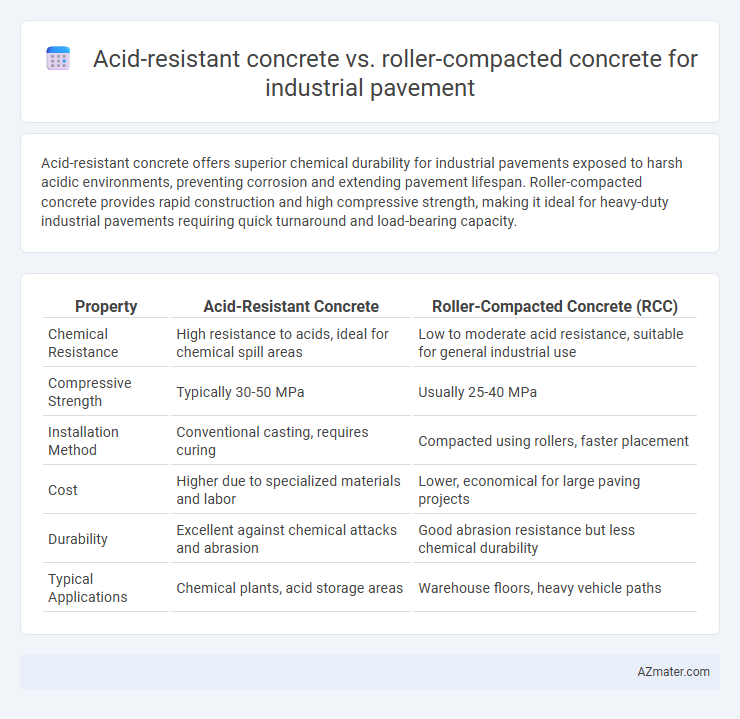Acid-resistant concrete offers superior chemical durability for industrial pavements exposed to harsh acidic environments, preventing corrosion and extending pavement lifespan. Roller-compacted concrete provides rapid construction and high compressive strength, making it ideal for heavy-duty industrial pavements requiring quick turnaround and load-bearing capacity.
Table of Comparison
| Property | Acid-Resistant Concrete | Roller-Compacted Concrete (RCC) |
|---|---|---|
| Chemical Resistance | High resistance to acids, ideal for chemical spill areas | Low to moderate acid resistance, suitable for general industrial use |
| Compressive Strength | Typically 30-50 MPa | Usually 25-40 MPa |
| Installation Method | Conventional casting, requires curing | Compacted using rollers, faster placement |
| Cost | Higher due to specialized materials and labor | Lower, economical for large paving projects |
| Durability | Excellent against chemical attacks and abrasion | Good abrasion resistance but less chemical durability |
| Typical Applications | Chemical plants, acid storage areas | Warehouse floors, heavy vehicle paths |
Introduction to Industrial Pavement Solutions
Acid-resistant concrete offers superior protection against chemical corrosion, making it ideal for industrial pavements exposed to harsh acidic environments. Roller-compacted concrete provides a durable, cost-effective alternative with rapid construction capabilities, suited for heavy traffic and load conditions. Selecting the appropriate industrial pavement solution depends on balancing chemical resistance requirements with mechanical strength and project timelines.
Overview of Acid-Resistant Concrete
Acid-resistant concrete is specifically formulated with chemical-resistant aggregates and cementitious materials to withstand aggressive acidic environments common in industrial settings. Its low permeability and enhanced durability protect against acid attack, making it ideal for flooring and pavements exposed to chemicals in manufacturing plants, wastewater treatment facilities, and food processing industries. Compared to roller-compacted concrete, acid-resistant concrete offers superior longevity and maintenance savings in environments where chemical resistance is critical.
Overview of Roller-Compacted Concrete
Roller-compacted concrete (RCC) is a dry, zero-slump concrete mixture compacted with vibratory rollers, offering high strength and rapid construction for industrial pavement. Its dense matrix provides excellent load-bearing capacity and resistance to abrasion, making it ideal for heavy-duty applications. Compared to acid-resistant concrete, RCC emphasizes structural durability and cost-effectiveness, though it may require additional surface treatments for enhanced chemical resistance.
Key Material Properties Comparison
Acid-resistant concrete exhibits superior chemical resistance due to its incorporation of specialized cementitious materials like silica fume and epoxy resins, making it ideal for environments exposed to aggressive chemicals and acidic waste. Roller-compacted concrete (RCC) offers high compressive strength and rapid construction benefits, featuring a low water-to-cement ratio and a dense, interlocked aggregate structure, which provides excellent load-bearing capacity but limited chemical resistance. Comparing these materials highlights acid-resistant concrete's enhanced durability against corrosion, whereas RCC prioritizes mechanical strength and fast installation for heavy industrial pavement applications.
Chemical Resistance and Durability
Acid-resistant concrete is specifically engineered with chemical additives and aggregates to withstand aggressive acidic environments, making it ideal for industrial pavements exposed to chemicals like sulfuric and hydrochloric acid. Roller-compacted concrete offers exceptional durability and high compressive strength due to its dense, low-water content mix but lacks the inherent chemical resistance provided by acid-resistant formulations. Selecting between these materials depends on whether the pavement will face significant chemical exposure or primarily requires structural durability under heavy industrial traffic.
Load-Bearing Capacity and Structural Strength
Acid-resistant concrete offers superior chemical durability and moderate load-bearing capacity, making it ideal for industrial pavements exposed to corrosive environments. Roller-compacted concrete (RCC) provides high structural strength and enhanced load-bearing capacity due to its dense, compacted mix, suitable for heavy-duty industrial traffic. Comparing both, RCC excels in mechanical performance, while acid-resistant concrete prioritizes chemical resistance without compromising basic load support requirements.
Installation Methods and Construction Speed
Acid-resistant concrete for industrial pavement requires meticulous mixing and curing processes to ensure chemical durability, often resulting in longer installation times due to its specialized material composition. Roller-compacted concrete (RCC) offers rapid construction speed through efficient placement using heavy rollers, enabling faster compaction and minimal finishing compared to traditional concrete methods. The installation of RCC involves dry, low-slump concrete spread and compacted by rollers, making it highly suitable for large-scale industrial pavement projects with tight schedules.
Cost Analysis: Initial and Lifecycle Costs
Acid-resistant concrete offers higher initial costs due to specialized materials designed to withstand chemical exposure, significantly reducing maintenance and repair expenses over its lifecycle. Roller-compacted concrete (RCC) provides lower upfront costs with rapid installation but may incur increased long-term maintenance when exposed to aggressive industrial chemicals. Selecting acid-resistant concrete enhances lifecycle cost efficiency for industrial pavements subject to corrosive substances, while RCC suits applications prioritizing short-term budget constraints and faster project completion.
Typical Industrial Applications
Acid-resistant concrete is widely used in industrial settings such as chemical plants, wastewater treatment facilities, and pharmaceutical manufacturing where exposure to corrosive substances like sulfuric acid and hydrochloric acid is frequent. Roller-compacted concrete (RCC) is preferred for heavy-duty industrial pavement applications including loading docks, warehouses, and container yards due to its rapid construction, high compressive strength, and durability under heavy traffic loads. Selection depends on specific chemical resistance needs versus structural performance requirements in industrial environments.
Choosing the Right Concrete for Specific Needs
Acid-resistant concrete offers superior durability and chemical resistance for industrial pavements exposed to aggressive substances, minimizing deterioration in environments like chemical plants or wastewater treatment facilities. Roller-compacted concrete provides rapid construction and high load-bearing capacity, ideal for heavy traffic industrial areas requiring quick turnaround and cost efficiency. Selecting between these concretes depends on balancing chemical exposure risks against operational demands and budget constraints to ensure longevity and performance.

Infographic: Acid-resistant concrete vs Roller-compacted concrete for Industrial pavement
 azmater.com
azmater.com